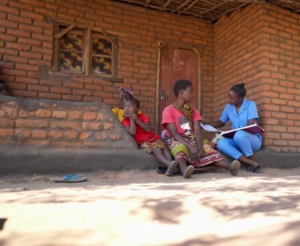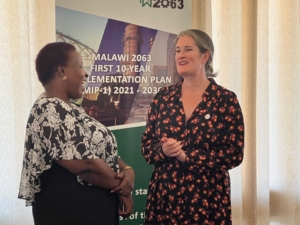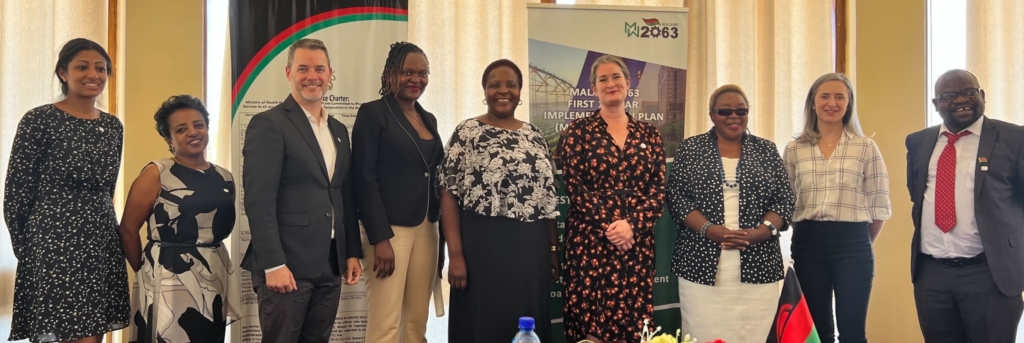The COVID-19 pandemic cast the urgency of funding health systems into sharp relief. Strong national health systems–and equitable, sustainable coverage at the community level–are critical to a future where all people, everywhere, can access the care they need. But a key component of lasting systems change is sustained financing. In Malawi, Last Mile Health has partnered with the Ministry of Health and others to build a pathway to stronger, more durable funding resources through community health financing advocacy at the national level.
Envisioning a new landscape for community health financing in Malawi
Of Malawi’s population of 17.6 million, 84% live in rural areas–and 10% of this rural population lives more than eight kilometers from the nearest health facility. Malawi has had a community health program since the 1970s and the program now employs over 7,000 community health workers, and throughout the implementation of Malawi’s National Community Health Strategy (2017-2022), community health has proven to be a worthwhile investment with a proven impact on increasing maternal and child health access. But one in five Malawians still does not have access to high-quality essential health services, and funding has been a significant barrier to maximizing the reach and impact of the program: the Ministry’s 2022 review of the strategy identified a gap of up to $240 million, making many of its targets unattainable.
For Malawi’s community health workers, the funding gap can mean irregular supplies and staggering caseloads. “Firstly, as community health workers, we serve a huge population. This has an impact on our ability to provide quality care,” explains Aaron Kaleso, a community health worker in Chikwawa District. “For example, in my community, I serve a population of 2,153 people when I should serve a population of 1,000 people. Secondly, I know that some community health workers are operating without protective wear and other equipment to help them perform their job well. We need simple things like gloves and other protective equipment, especially during this COVID-19 pandemic, to ensure our own safety.”
During the development of the 2017-2022 strategy’s successor, the National Community Health Framework (2022-2030), the Ministry of Health recognized the need to advance an advocacy agenda on financing and resource mobilization. With a strong track record and technical expertise in mobilizing sustainable community health financing, Last Mile Health was well-positioned to partner on this effort. Together, the Ministry and Last Mile Health conducted resource mapping to understand the current realities of Malawi’s community health financing landscape–and build a roadmap for change.
Alongside a coalition of like-minded organizations, Last Mile Health and the Ministry built consensus on key elements and produced the Community Health Financing and Advocacy Plan (2022-2030) to guide resource mobilization efforts. Health financing was introduced as a seventh thematic area in the National Community Health Framework. A crucial step towards facilitating policy change and reforms on community health implementation, the financing and advocacy plan outlines a framework mobilizing adequate financial and technical resources to meet community health financing targets by 2030. The plan will be operationalized via three key objectives:
- Last Mile Health and the Ministry identify sources of funding from government, private sector, and partners; Last Mile Health supports the Ministry to pursue and secure funding to close the $240 million community health funding gap
- The Ministry collaborates with implementing partners to catalyze political prioritization and donor commitment for increased financial investment in community health
- Decision-makers at district level use evidence to optimize planning and advocate for increased resource allocation and accountability to increase community health resources
The plan seeks to drive a fundamental shift in health system strengthening and financing to enable the scaling and sustainability of community health service delivery. It will nurture strategic partnerships to mobilize additional domestic financial allocation for community health; strengthen donor and partner coordination to reduce fragmentation and promote accountability; and engage political leaders to catalyze support and prioritization of community health as well as to advocate for the integration of community health workers in pandemic preparedness and response.
The impact of strengthened community health financing
Government and systems leaders often design well-intentioned policies and ambitious targets–but these policies require the proper systems in place for effective implementation. Malawi’s Community Health Financing and Advocacy Plan is an example of such a system: it represents not a target, but a concrete, operationable, and measurable plan catalyzing the advancement of community health financing policy. Following development and costing in partnership with Last Mile Health, the Ministry of Health plans to commission the plan in November 2022–and together, Last Mile Health and the Ministry are excited to embark on its implementation.
An intentional and structured commitment to community health financing, represents a major step toward bringing Malawi’s community health goals within reach. “A community health financing pillar entails having clear-cut mechanisms of financing what is in the framework–something we did not have in the first strategy,” explains Doreen Namagetsi Ali, the Ministry of Health’s Deputy Director of Preventive Health Community Health Services Section. “This is a game changer.”
Once sustainable channels of funding are established and maintained, the national community health program will receive the consistent financial support it needs in order to recruit, upskill, deploy, pay, and supply community health workers and their supervisors as a fully integrated arm of the national health system, bringing care within reach of millions of Malawians in hard-to-reach communities. “The outcomes of this process will be increased access to essential health services at all levels,” says Maziko Matemba, Director of the Health and Rights Education Programme, Malawi.







